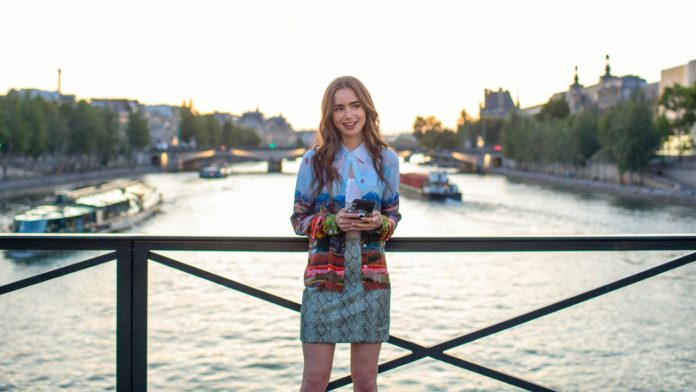
Emily in Paris showrunner Darren Star is a master of creating television that provokes a reaction. The man behind Beverly Hills, 90210, Melrose Place, Sex and the City, and Younger knows how to reel in viewers with his patented mix of aspirational fantasy, romance, and edginess. (Remember the 90210 episode where Brandon takes the drug U4EA at a rave? Or the early Sex and the City episode that had the gang counseling Charlotte on the pros and cons of anal sex?)
In some ways, Emily in Paris is a bonbon perfectly suited to the pandemic moment. While many of us were in a lockdown malaise, Emily—a young marketing executive and social media whiz played by Lily Collins—romps through Paris’s cobblestoned streets wearing beautiful clothes and kissing beautiful Gallic men. She is also regularly schooled by her French colleagues. Although she knows little about French culture beyond the movies Moulin Rouge! and Ratatouille, Emily triumphs at her job, bringing an American influencer’s marketing savvy to French culture. Her grande victoire, inspired by her work on a vaginal-dryness product for menopausal women, is an Instagram post mocking the fact that the word vagina is gendered masculine in France.
After it premiered last October, Emily became Netflix’s top comedy, according to the streamer. It also pissed off French critics, irked social media experts, and sent some Americans into a hate-watching frenzy. The series’ surprise Golden Globe nominations triggered a backlash, especially after the L.A. Times alleged that members of the Hollywood Press Association had been flown to the Paris set and treated to a luxury hotel. Despite all that, Emmy voters bestowed on it a best-comedy nomination, Netflix ordered a second season—and viewers kept watching.
Star, who had just returned from shooting in Paris, talked to V.F. about the controversy swirling around Emily, plans for season two, and his feelings about the Sex and the City reboot.
Vanity Fair: Emily in Paris revels in the romance and glamour of France, but it must have been somewhat unglamorous shooting season two in the midst of Covid, with all the masks and lockdowns.
Darren Star: When we started filming at the end of April in the south of France, we took over what is probably one of the most glamorous places in the world, the Four Seasons’ Cap Ferrat hotel, where we were staying and filming. The hotel was essentially closed except for us. We had our writers room in a villa on the property, so it actually was surreal—everything in France was shut down at the time. If you throw writers together in a room with food and don’t let them leave, you get a lot of work done!
It sounds like the best TV writing job ever. I assume the pandemic won’t be happening in Emily’s season two universe?
In the timeline of the show, it just hasn’t happened yet.
The show feeds on cultural differences between Emily and her French co-workers. Was that inspired by snobbery you experienced during your visits there over the years?
I’ve been to Paris many times and obviously I love it. That’s why I keep going back—I’m not a masochist! I do feel like the French are lovely people but I can see Americans and how they look from their point of view. There’s something to that cliche of the ugly American who comes to a foreign country, doesn’t learn the language or understand the customs and just basically wants everything to be as it is in America. In some ways, that’s Emily at the beginning of the show. Americans are told we can do anything, be anyone we want. French people [see] their culture as being the center of universe, as do we. That’s why there’s a culture clash. [laughs]
Some French critics were incensed by the show. Did you get angry responses from French viewers?
No, this show was bigger in France than anywhere in the world. If anything, it was maybe the first non-French series that really put the focus on French culture and French people. Maybe it got taken a little too seriously [by critics] but there was always a sense of humor behind the portrayals.
A few years before writing the pilot, I rented an apartment there and spent time in a French marketing firm. After a couple days there, I asked the woman who was the head of the firm, so what do French people think of Americans who work in Paris? She paused and said, “Actually, we don’t think of them at all.” That’s the attitude! I love that as much as Americans dream of living in Paris, the French, they’re really not giving us that much thought.
That’s a perfect French diss.
One thing that changes [next season] is we spend more time with a lot of the French characters. Because the show was done for an American network initially, I didn’t know how much French with subtitles an American audience was going to tolerate. Knowing that we’re reaching a global audience, there’s a lot more subtitled content.








